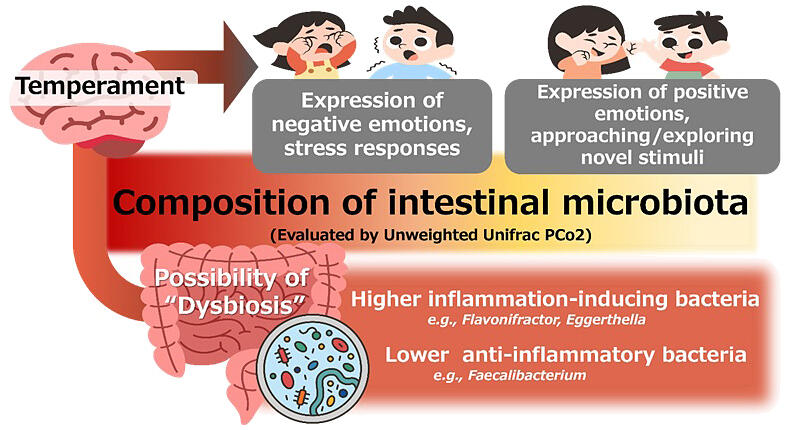A research group led by Professor Masako Myowa and Graduate Student Eriko Ueda (at the time of the study) of the Graduate School of Education at Kyoto University, and Michiko Matsunaga (JSPS Research Fellow) of the Graduate School of Medicine at Osaka University has announced their research results showing that temperament (the expression of negative emotionality and the characteristics to actively explore and approach novel environments) during early childhood is associated with the gut bacteria composition. The discovery was made through a survey and analysis of 284 Japanese preschool children aged 3-4 years from all over Japan. The study showed that the risk for mental health problems may be mitigated or prevented by improving the gut microbiota in early childhood. The results were published in the September 5 issue of the international journal Developmental Psychobiology.

Provided by Kyoto University
Recent studies in adults have shown that depression and other psychiatric disorders are associated with the diversity and composition of the gut microbiota. Meanwhile, the association with children remains unknown. Approximately 15% of children from infancy to adolescence worldwide are reportedly at risk for mental health problems such as psychiatric and neurodevelopmental disorders, and signs of these problems are seen during the first three years of life. Thus, developing intervention strategies to address or prevent these problems from the early stages of life is awaited.
Until now, the research group has focused on gut microbiota as a factor related to individual differences in the development of mental and cognitive functions. In this study, they focused on temperament, a behavioral trait in the early postnatal period. In particular, they examined the association of gut microbiota with negative emotionality and stress response characteristics related to psychobehavioral risks.
Temperament, which makes up part of a personality, is a behavioral trait that controls the response to environmental stimuli, including people, in the domains of affect, activity (behavior), and attention, and is thought to appear soon after birth and be maintained in a stable manner. Temperament is evaluated based on three higher order factors: (1) negative affectivity (expression of negative emotions such as fear, sadness, and anger, and reaction to threatening stimuli), (2) surgency/extraversion (expression of positive emotions such as smiling, and active exploration of and approach to novel environments), and (3) effortful control (control of behaviors in (1) and (2)). Among the temperament components, individual differences in (1) and (3) have been known to be associated with problematic behavior and mental illness in later stages of life.
The study included 284 healthy Japanese children aged 3-4 who attended nursery schools, kindergartens, and children's centers in Japan. Their parents were asked to complete a questionnaire survey on their children's temperament and collect fecal samples from their children. The relationship between temperament and intestinal bacteria was investigated and analyzed. An exploratory preliminary study using correlation analysis was performed, followed by multiple regression analysis.
In the multiple regression analysis model, the temperament score was used as a dependent variable, gut microbiota diversity (alpha diversity) and gut microbiota composition (beta diversity) were used as independent variables, and children's age and gender were used as covariates. The results showed an association between the beta diversity of the gut microflora and temperament.
Higher scores on the higher-order temperament factor "negative affectivity" and the subscales "fear," "sadness," and "shyness" were negatively associated. Higher scores on the higher-order factor "surgency/extraversion" and the subscale "impulsivity" were positively associated. When the contribution of different bacteria to the composition of beta diversity was examined, it was found that the lower the beta diversity, the abundance of Faecalibacterium spp., which are involved in butyrate production and anti-inflammation, was lower. Also, the abundance of Eggerthella and Flavonifractor spp., which are involved in inducing inflammation, were higher. Furthermore, alpha diversity was positively associated with the temperament subscale "impulsivity."
These results indicate that children with lower diversity of gut microbiota are more prone to express negative emotions and stress responses and less prone to express positive emotions and exploratory behaviors toward novel environments and stimuli. The results also indicate that children with higher gut microbiota diversity are more prone to try new things and act on their motivations.
The gut microbiota changes between 3 and 5 years of age, and once stabilized, it is maintained until adulthood. The prefrontal cortex, which is associated with mental health, develops in the same period. Therefore, the findings suggest that intervention during this period may reduce risk.
Journal Information
Publication: Developmental Psychobiology
Title: Temperament in Early Childhood Is Associated With Gut Microbiota Composition and Diversity
DOI: 10.1002/dev.22542
This article has been translated by JST with permission from The Science News Ltd. (https://sci-news.co.jp/). Unauthorized reproduction of the article and photographs is prohibited.




